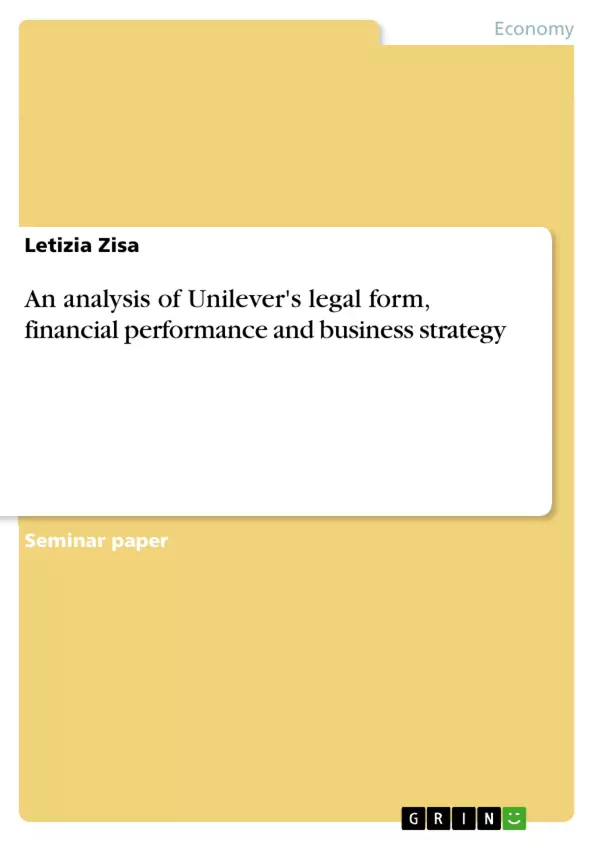Unilever Group PLC
“Unilever is one of the world’s leading suppliers of fast moving consumer goods. We aim to meet everyday consumer needs for nutrition, hygiene and personal care with brands and services that help people to feel good, look good and get more out of life” (Unilever, Director's Report, p. 17). It generates revenues through four main business segments: savoury, dressings and spreads, personal care, ice cream and beverages and home care.
Vision & Mission Statement
A company´s mission can be defined as “the overriding purpose in line with the values or expectations of stakeholders” (Johnson & Scholes, 2005, p.13).
“We work to create a better future every day. We help people feel good, look good and get more out of life with brands and services that are good for them and good for others. We will inspire people to take small everyday actions that can add up to a big difference for the world. We will develop new ways of doing business with the aim of doubling the size of our company while reducing our environmental impact“.
Unilever's legal business form
Commonly, there are three types of business organisations; sole traders, partnerships, limited companies. Unilever is a “Public Limited Company” (PLC) which means that it is permitted to advertise its shares to the public on the stock exchange market and which is registered as a public limited company (Companies Act 2006, 58 (1)). “Public companies are aimed at securing investment from the general public” (Lowry et al., 2006, p.9). A public company cannot commence business or lend any capital unless it has been issued an “S 117 Certificate” and has a registered office (Companies Act 2006, 86). Such a certificate is issued when the Registrar identified that the nominal value of the company's share capital is not less than the authorised £50,000 (Companies Act 2006, 761 (1)). A public company is either limited by shares or by guarantee with a share capital and must have at least 2 directors (Companies Act 2006, 154).
Major Duties of a corporation
Since Unilever is a PLC it has major duties to fulfil. It must publish a prospectus giving a detailed and accurate description of the company’s plans. Consequently, Unilever's directors have the duty to prepare a directors' report for every financial year of the company, to keep their accounting books and records, (Companies Act 2006, 386) prepare annual accounts and hold an Annual General Meeting.
Inhaltsverzeichnis (Table of Contents)
- Introduction
- Part I - Legal Form
- Unilever's legal business form
- Major Duties of a corporation
- Corporate Crime
- Ethics and Finance
- Corporate Governance
- Unilever's Stakeholders
- Responsibilities towards Stakeholders
- Unilever's legal business form
- Part II - Financial Analysis
- Consolidated Profit and Loss Account
- Horizontal Analysis
- Turnover
- Operating Costs
- Operating Profit
- Operating Profit Margin
- Financial Ratios - Profitability
- Efficiency
- Liquidity
- Gearing
- Part III - Business Strategy
- Strategic Analysis
- Value Chain
- Budgetary Control
- Balanced Scorecard
Zielsetzung und Themenschwerpunkte (Objectives and Key Themes)
This financial assessment report aims to provide information regarding Unilever's legal business form, analyzing its compliance and impact on financial performance and stakeholder interactions. The report investigates Unilever's financial performance compared to industry benchmarks, proposing a business strategy to enhance its financial outcomes. The study focuses on investors as key stakeholders.
- Unilever's legal business form and its compliance with regulatory frameworks
- Impact of legal form on financial performance and stakeholder interactions
- Financial analysis of Unilever's performance compared to benchmarks
- Business strategy recommendations for enhancing turnover, reducing costs, and increasing profit margin
- Utilizing business tools like budgetary control, gap analysis, and balanced scorecard frameworks
Zusammenfassung der Kapitel (Chapter Summaries)
- Introduction: Introduces Unilever, a leading fast-moving consumer goods company, highlighting its core business segments and its global reach. It defines a company's mission and presents Unilever's mission statement, emphasizing its focus on sustainability and growth.
- Part I - Legal Form: This section examines Unilever's legal business form and its implications for financial performance. It explores major duties of corporations, including compliance with regulations and ethical considerations. It also delves into corporate governance and the importance of stakeholder engagement.
- Part II - Financial Analysis: This part analyzes Unilever's financial performance by examining its consolidated profit and loss account. It conducts a horizontal analysis of key financial metrics like turnover, operating costs, operating profit, and operating profit margin. The analysis also explores financial ratios, including profitability, efficiency, liquidity, and gearing.
- Part III - Business Strategy: This section focuses on Unilever's business strategy, evaluating its strategic analysis, value chain, budgetary control mechanisms, and balanced scorecard framework. It aims to identify opportunities for improvement and provide recommendations to enhance Unilever's competitive advantage.
Schlüsselwörter (Keywords)
This report focuses on key concepts like corporate governance, stakeholder engagement, financial performance, legal compliance, business strategy, budgetary control, balanced scorecard frameworks, and financial ratios, analyzing their relevance to Unilever's operations and overall success.
Frequently Asked Questions
What is Unilever's legal business form?
Unilever is a Public Limited Company (PLC), meaning it can offer shares to the general public on the stock exchange.
What are the main duties of a PLC like Unilever?
Major duties include publishing a prospectus, preparing annual accounts, keeping records, and holding an Annual General Meeting (AGM).
What are Unilever's main business segments?
Unilever operates in four main areas: personal care, home care, ice cream and beverages, and savoury, dressings and spreads.
What is the focus of Unilever's mission statement?
The mission focuses on meeting everyday needs for nutrition and personal care while doubling the company size and reducing environmental impact.
Which financial tools are used in the analysis?
The report utilizes horizontal analysis, financial ratios (profitability, liquidity, gearing), and the Balanced Scorecard framework.
- Citar trabajo
- Letizia Zisa (Autor), 2010, An analysis of Unilever's legal form, financial performance and business strategy, Múnich, GRIN Verlag, https://www.grin.com/document/171351



